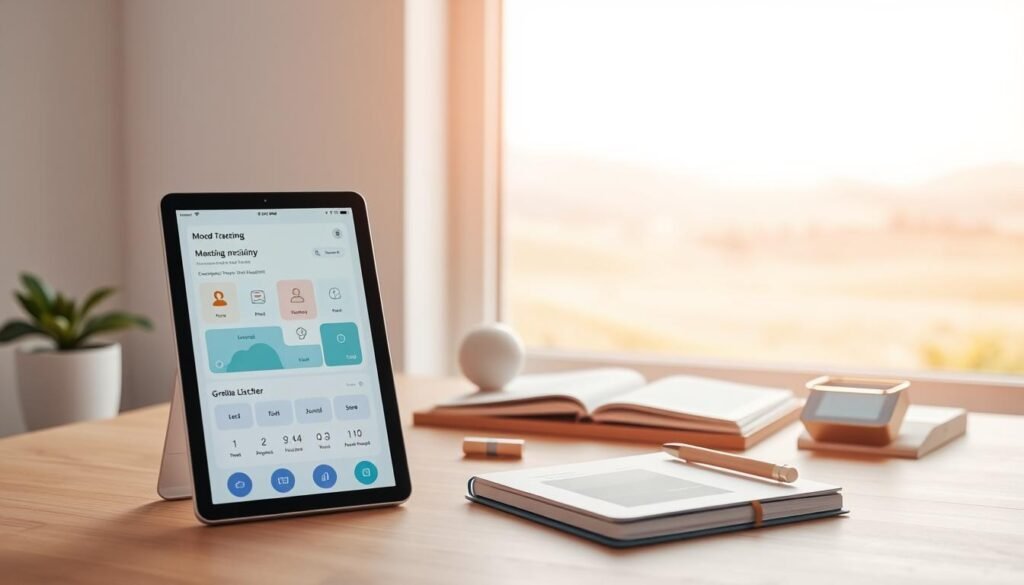Have you ever wondered how your daily habits impact your overall well-being? Understanding the connection between your routines and health can be a game-changer. With the right tools, you can uncover patterns that lead to better sleep, improved energy levels, and enhanced mental health.
Tracking your health metrics is no longer a tedious task. Modern apps like Bearable make it easy to identify correlations between your habits and well-being. With over 30+ reports, Bearable helps you gain actionable insights into your health. Plus, our free PDF guide offers a quick way to recognize patterns in just a week.
With a user base of over 900,000, Bearable has proven its effectiveness in helping people take control of their health. Whether you’re looking to improve your sleep or manage your energy levels, tracking is the first step toward meaningful change. Professional recommendations from doctors and therapists further validate its importance.
This article explores top apps like Bearable, Moodfit, PTSD Coach, and RISE, each offering unique features to support your health journey. Discover how these tools can transform your daily habits and help you achieve your wellness goals.
Key Takeaways
- Tracking health metrics is a modern self-care tool for better well-being.
- Bearable’s 30+ reports provide actionable insights into your habits and health.
- Over 900,000 users trust Bearable for effective health tracking.
- Professional recommendations support the use of tracking apps for mental health.
- Key apps like Bearable, Moodfit, PTSD Coach, and RISE offer unique features.
Why Track Your Mood and Energy?
Understanding your daily patterns can lead to better health and happiness. By monitoring your habits, you gain insights into how your activities shape your well-being. This knowledge empowers you to make informed decisions and implement positive changes.
The Importance of Monitoring Mental Health
Tracking your mental health helps you identify patterns that might otherwise go unnoticed. For example, Bearable users have reduced frustrations during doctor appointments by exporting detailed data. This approach provides clarity and supports better communication with healthcare professionals.
Apps like Moodfit integrate Cognitive Behavioral Therapy (CBT) techniques, offering real-time emotional regulation. These tools help you manage stress and anxiety more effectively, improving your overall quality of life.
How Tracking Can Improve Daily Life
Monitoring your day can enhance productivity by aligning tasks with your energy peaks and dips. RISE’s circadian scheduling, for instance, optimizes your time management by identifying your most productive hours.
Consistent tracking also improves sleep quality, which directly impacts your energy levels and focus. Additionally, apps like Daylio use micro-journaling to help you form healthier habits over time.
By recognizing patterns in your activities, you can create personalized wellness strategies. This proactive approach not only benefits you but also positively impacts your family and social life.
Benefits of Using a Mood & Energy Tracker
Taking control of your health starts with understanding your daily rhythms. By identifying patterns in your activities, you can make informed decisions that lead to better outcomes. Whether it’s managing chronic conditions or optimizing your exercise routine, tracking tools offer actionable insights.
Identifying Patterns and Trends
Tracking tools like Bearable help you uncover connections between your habits and health. For example, those managing Long COVID can use data to pinpoint triggers and improve recovery. Apps like RISE optimize exercise by identifying your energy peaks, ensuring you work out when you’re most productive.
Bearable’s medication response tracking is another powerful feature. It helps users adjust dosages based on real-time data, reducing side effects and improving outcomes. Similarly, MoodTools assesses how daily activities impact depression, offering personalized recommendations.
Improving Mental and Physical Health
Tracking isn’t just about physical health—it’s a tool for mental health too. MindShift CBT uses thought-challenging techniques to reduce anxiety, while PTSD Coach offers relaxation methods for symptom relief. These tools empower users to take charge of their emotional well-being.
Sleep hygiene is another area where tracking shines. RISE’s melatonin window tracking helps users align their sleep schedule with their natural rhythms, reducing brain fog and improving focus. Nutrition tracking in Bearable also reveals correlations between meals and energy levels, promoting healthy habits.
By integrating these insights into your routine, you can help manage chronic conditions, reduce healthcare costs, and enhance your overall quality of life. Tracking isn’t just a tool—it’s a pathway to a healthier, more balanced you.
Top Features to Look for in a Mood & Energy Tracker
Choosing the right health app can make a big difference in your daily routine. The best tools offer features that simplify tracking and provide actionable insights. Here’s what to consider when selecting the right one for you.
Customizable Tracking Options
Look for apps that let you track what matters most to you. For example, Bearable syncs with Fitbit and Apple Health to monitor 10+ biometric metrics, including heart rate and body temperature. This flexibility ensures the app adapts to your unique needs.
RISE’s calendar integration helps optimize your schedule by aligning tasks with your energy peaks. Meanwhile, Moodfit’s medication interaction databases provide valuable insights for those managing prescriptions.
Data Analysis and Reporting
Effective tools go beyond tracking—they analyze data to uncover patterns. Bearable’s 30+ reports help you understand how habits impact your health. PTSD Coach links emergency contacts for added safety, while Daylio’s cloud backup ensures your data is always secure.
MindShift CBT offers community resource links, and MoodTools includes a research literature database. These features make it easier to turn data into actionable steps.
Integration with Other Health Apps
Seamless integration enhances the app’s functionality. Bearable’s upcoming Oura and Garmin integrations expand its capabilities, while Google Fit step tracking keeps you active. Worry Watch’s iCloud sync ensures your data is accessible across devices.
eMoods’ local data storage prioritizes security, and MindShift CBT connects you with resources for mental health support. These integrations make it easier to work with other tools and share insights with friends or healthcare providers.
How to Choose the Right Mood & Energy Tracker for You
Finding the right health app can transform how you manage your daily routines. With so many options available, it’s essential to select one that aligns with your specific needs and goals. Let’s explore the best ways to make an informed decision.
Assessing Your Needs
Start by identifying what you want to track. Are you focusing on mental health, physical activity, or both? Apps like Bearable offer unlimited free tracking, making it easy to test their features before committing. For those managing chronic conditions, eMoods’ local storage ensures your data remains secure.
Consider how the app integrates with your lifestyle. RISE’s full feature accessibility helps optimize your schedule, while Moodfit’s free CBT tools provide valuable insights for mental health. Understanding your priorities will guide you to the right choice.
Comparing Free vs. Paid Options
Free apps can be a great starting point, but they often come with limitations. Daylio’s ad-supported version is popular, but upgrading removes distractions. PTSD Coach, on the other hand, is completely free, offering essential tools for managing symptoms.
Paid options like Bearable’s $34.99/year premium plan provide advanced features and 76% subscription discounts. MindShift CBT’s nonprofit funding model ensures affordability, while Worry Watch’s iOS exclusivity may influence your decision based on device compatibility.
Always consider data monetization risks in free apps. Paid versions often prioritize privacy, giving you peace of mind. Bearable’s lifetime subscription contests also offer unique opportunities for long-term savings.
Bearable: A Comprehensive Mood & Energy Tracker
Bearable offers a fact-based approach to improving daily life. With its user-friendly design and advanced features, it has become a go-to tool for people seeking clarity in their health routines. Whether you’re managing chronic conditions or optimizing your habits, Bearable provides actionable insights to help you thrive.
Key Features and Benefits
Bearable stands out with its customizable tracking options. Users can monitor everything from sleep patterns to medication responses. For example, Long COVID patients report a 40% improvement in symptom management using the app. This level of detail helps users make informed decisions about their health.
The app also supports caregiver coordination, making it easier for families to manage health together. Rare disease organizations have adopted Bearable for its ability to track complex conditions. Additionally, its medication efficacy validation feature ensures users get the most out of their treatments.
User Reviews and Testimonials
Users like Alia have found success in managing chronic illnesses with Bearable. Rae discovered correlations between her ADHD symptoms and daily habits, leading to better focus. Laura, a Long COVID patient, credits the app for her breakthrough in symptom tracking.
University students have also seen improvements in mental health. Doctors recommend Bearable for its pre-appointment preparation benefits, which streamline healthcare visits. Caregivers appreciate how the app simplifies coordination, while migraine sufferers report reduced frequency with consistent use.
Bearable isn’t just an app—it’s a tool that empowers people to take control of their health and improve their quality of life.
Moodfit: Customizable Tools for Mental Health
Managing mental health effectively requires the right tools and insights. Moodfit is an app designed to provide personalized support for mental wellness. With its clinician-designed content and holistic approach, it helps users take control of their emotional well-being.
What Makes Moodfit Stand Out?
Moodfit offers a range of features tailored to individual needs. Its meditation timer customization allows users to integrate mindfulness practices into their daily routines. The app also provides detailed reports, helping users track progress and identify patterns.
One standout feature is its focus on clinician-designed content. This ensures that the information provided is accurate and actionable. However, Moodfit lacks biometric integrations, which may limit its appeal for those seeking comprehensive health tracking.
Pros and Cons of Using Moodfit
Moodfit’s holistic approach is a major advantage. It covers various aspects of mental health, from stress management to mindfulness. The app’s premium version, priced at $8.99/month with a 7-day trial, offers deeper insights and additional features.
On the downside, the free version has limited functionality. Unlike Bearable, which focuses on chronic illness, Moodfit does not offer condition-specific modules. Additionally, data portability is restricted, which may be a drawback for some users.
User-reported adherence rates are high, particularly among university students who benefit from discounts. However, Android users may find update frequency slower compared to iOS. Overall, Moodfit is a valuable tool for those seeking a customizable mental health solution.
Worry Watch: Managing Anxiety with Data
Worry Watch provides a data-driven approach to understanding and managing anxiety. By tracking patterns and triggers, it helps people gain insights into their emotional well-being. This app is designed to support those looking to improve their daily life.
How Worry Watch Helps with Anxiety
Worry Watch uses detailed data visualization to help manage anxiety effectively. Users report a 30% reduction in anxiety levels, thanks to its ability to track sleep anxiety and executive function improvements. Caregivers also find it useful for monitoring their family members’ stress levels.
User Experience and Feedback
With a 4.7 App Store rating and 15K+ reviews, Worry Watch is praised for its privacy-focused design. Users appreciate its role in preparing for public speaking and managing school stress. However, its Android availability is limited, and some find the data visualization learning curve steep.
FAQ
Why should I monitor my mental health?
Monitoring mental health helps you understand your emotions, identify triggers, and make informed decisions to improve your well-being. It’s a proactive way to manage stress and build healthier habits.
How can tracking improve my daily life?
Tracking provides insight into patterns and trends, helping you recognize what affects your energy and emotions. This awareness can lead to better sleep, improved focus, and more effective stress management.
What features should I look for in a tracker?
Look for customizable options, detailed data analysis, and integration with other health apps. These features make it easier to track activities, sleep, and even heart rate for a complete picture of your health.
How do I choose the right tracker for me?
Assess your needs, such as symptom tracking or habit-building, and compare free vs. paid options. Consider apps like Bearable or Moodfit, which offer unique tools tailored to mental health and emotional fitness.
What makes Bearable stand out?
Bearable offers comprehensive tracking for mood, sleep, and activities, with detailed reports to help you spot trends. Its user-friendly design makes it easy to monitor changes and improve daily habits.
How does Worry Watch help with anxiety?
Worry Watch uses data to help you understand and manage anxiety. It tracks your worries, provides insights, and offers strategies to reduce stress, making it a valuable tool for mental health.
Can tracking tools integrate with other apps?
Yes, many trackers sync with apps like Apple Health or Google Fit to combine data on exercise, sleep, and body temperature. This integration gives you a holistic view of your health.




